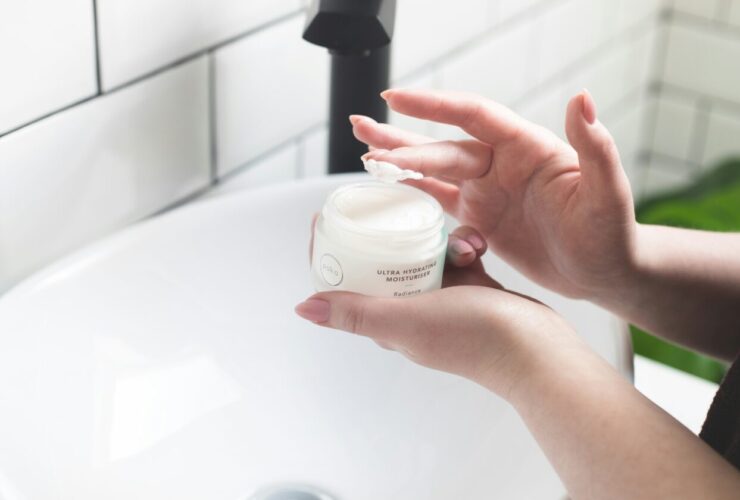Introduction
Skin health is paramount to overall well-being. Our skin is the body’s largest organ, protecting us from environmental stressors and maintaining vital functions. However, factors such as aging, pollution, and improper skincare routines can compromise its integrity, leading to common skin concerns like dullness, uneven texture, and hyperpigmentation. In pursuing radiant and healthy skin, individuals often turn to skincare products enriched with potent ingredients like Vitamin C.
Understanding the Role of Vitamin C in Skincare
Vitamin C, also known as ascorbic acid, is celebrated for its antioxidant properties and numerous benefits for skin health. It plays a crucial role in collagen synthesis, helping to maintain skin elasticity and firmness. Additionally, Vitamin C boasts potent antioxidant properties, which help neutralize free radicals and protect the skin from oxidative stress. As a result, it can aid in reducing signs of aging, brightening the complexion, and promoting overall skin vitality.
Does Vitamin C Exfoliate?
One common question among skincare enthusiasts is whether Vitamin C exfoliates the skin. While Vitamin C does not directly exfoliate like traditional exfoliants such as AHAs or physical scrubs, its acidic nature can promote healthy cellular turnover. This means that Vitamin C can facilitate the shedding of dead skin cells, revealing smoother, more radiant skin underneath. However, its effects are more subtle and indirect than dedicated exfoliating agents.
Benefits of Vitamin C for Skin Concerns
Individuals facing common skin concerns such as dullness, uneven skin tone, and hyperpigmentation can benefit significantly from incorporating Vitamin C into their skincare routine. Vitamin C can help address these concerns and impart a more youthful appearance by promoting cellular turnover and brightening the complexion. Additionally, its antioxidant properties help protect the skin from environmental damage, reducing the risk of premature aging and improving overall skin health.
Nutritional Value of Vitamin C
In addition to its skincare benefits, Vitamin C is crucial in maintaining overall health. It supports immune function, aids in wound healing, and assists in iron absorption. Foods rich in Vitamin C include citrus fruits, strawberries, kiwi, bell peppers, and broccoli. Incorporating these nutrient-dense foods into your diet can give your body the Vitamin C needed to support internal and external health.
Considerations and Recommendations
While Vitamin C is generally safe for topical use, individuals with sensitive skin may experience irritation, especially when using highly concentrated formulations. It’s essential to patch-test new skincare products and start with lower concentrations of Vitamin C to assess tolerance. Additionally, when incorporating Vitamin C into your diet, opt for whole foods rather than relying solely on supplements to ensure you receive a balanced array of nutrients.
Practical Tips for Skincare and Nutrition
- Choose skincare products formulated with stable forms of Vitamin C, such as L-ascorbic acid or ascorbyl glucoside, to maximize effectiveness.
- Apply Vitamin C serums or creams daily as part of your morning skincare routine to protect the skin from environmental damage throughout the day.
- Incorporate Vitamin C-rich foods into your diet, such as citrus fruits, berries, and leafy greens, to support overall skin health from within.
- Maintain a balanced skincare routine that includes cleansing, exfoliating (with dedicated exfoliants), moisturizing, and sun protection to achieve optimal results.
Conclusion
In conclusion, while Vitamin C may not exfoliate the skin traditionally, it is vital in promoting healthy skin renewal and combating various skin concerns. Individuals can support their skin’s natural radiance and vitality by harnessing Vitamin C’s power through topical skincare products and dietary sources. Incorporate Vitamin C into your skincare routine and diet to unlock the full potential of this powerhouse antioxidant for glowing, youthful-looking skin.
References
Santos-Longhurst, A. (2018, September 26). What Does It Mean to Exfoliate? Why You Should and How to Start. Retrieved April 23, 2023, from Healthline website: https://www.healthline.com/health/beauty-skin-care/meaning-of-exfoliating
https://www.mindbodygreen.com/wc/jamie-schneider. (2020). mindbodygreen. Retrieved April 23, 2023, from Mindbodygreen.com website: https://www.mindbodygreen.com/articles/enzymes-vs-acids
MD, N., & Patel, P. (2021, November 10). Why is topical vitamin C important for skin health? – Harvard Health. Retrieved April 23, 2023, from Harvard Health website: https://www.health.harvard.edu/blog/why-is-topical-vitamin-c-important-for-skin-health-202111102635
Kilikita, J. (2020, March 12). The Expert’s Guide To Using Vitamin C. Retrieved April 23, 2023, from Refinery29.com website: https://www.refinery29.com/en-us/how-to-use-vitamin-c-serum
Was this helpful?

Joseph Emb, RDN
Founder of StyleVitally.com | Registered Dietitian & Wellness Advocate
What I Cover:
I’m passionate about connecting nutrition science and everyday wellness to help people live healthier, more vibrant lives. I write about evidence-based nutrition, mindful eating, sustainable lifestyles, and holistic well-being at StyleVitally.com.
My Background:
The University of Texas in Austin, where I earned my Dietetics diploma, laid the groundwork for my nutrition and health career. My training and hands-on experience taught me the science and art of using nutrition to enhance health and well-being.
Professional Journey:
I’m an RDN with lots of experience. I’ve helped people seeking tailored nutritional recommendations in clinical settings and community outreach programs. My constant learning and professional development ensure that my recommendations are always based on the latest evidence.
Ethical Commitment:
My practice prioritizes integrity. My content is transparent and objective, following the most significant ethical standards. I can give my audience unbiased advice because I’m not affiliated with food businesses or industry associations. I want to help people make informed health decisions that match their values and ambitions.
Join Me on the Wellness Journey:
Join me on the path to vitality and well-being, whether facing nutritional issues, seeking sustainable lifestyle changes, or simply wanting a better, happier you. We’ll discover how diet, mindfulness, and holistic well-being can maximize your potential.









